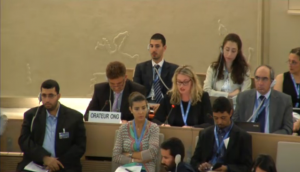
The British Humanist Association (BHA), in a joint statement with the British Pregnancy Advisory Service (BPAS), has spoken out against restrictive abortion laws as part of the 32nd regular session of the United Nations Human Rights Council (UNHRC).
40% of women are subject to restrictive abortion laws worldwide, despite the recognition that legal restrictions on abortion do not reduce the likelihood that women who wish to terminate their pregnancy will seek abortion services. Countries such as the Republic of Ireland and Northern Ireland export their citizens wishing to make use of abortion services to neighbouring countries with more lenient laws, therefore limiting access to women and girls who can afford the journey.
In a speech to the assembled nations of the United Nations, in an interactive dialogue with the working group on the issue of discrimination against women in law and in practice, the BHA and BPAS highlighted some of the unintended consequences of ‘retrogressive anti-abortion laws’ such as women being convicted and imprisoned for suffering a miscarriage. For example, a Salvadoran woman was sentenced to 40 years prison in 2011, and despite the Obmudsman for Human Rights in El Salvador admitting that her human rights were violated during the trial, she remained in prison until May this year.
The Republic of Ireland was cited as an example of a country that merely exports its abortion-seeking women, reminding the delegation that over the past 35 years, an estimated 166,951 women have travelled to the UK to seek abortion services.
The statement ended by calling on those countries who ‘have laws and policies which restrict access to reproductive and sexual health services to decriminalise abortion’ and ensure that all citizens, including women, have access to the highest attainable standard of mental and physical health possible, a fundamental human right to be guaranteed to all under international law.
Pavan Dhaliwal, Director of Public Affairs and Policy at the BHA, commented, ‘In many parts of the world women are treated as second class citizens, robbed of their fundamental rights and denied access to basic healthcare services. As humanists, we remain committed to the right of all women to have control over their own health and lives by having free access to safe, legal abortions, wherever they happen to live.’
Katherine O’Brien of BPAS commented, ‘Laws which restrict abortion do not stop women ending pregnancies they feel unable to continue, but they do put women’s health and lives at risk. One in three women will have an abortion in their lifetime. These women deserve care and compassion – not criminalisation. It is unacceptable that in 2016, women in the UK – and many other countries – can still face imprisonment for inducing their own miscarriage, and that women are being prosecuted under our archaic abortion laws. We urge all governments to decriminalise abortion and ensure that this essential aspect of healthcare is as accessible as possible.’
Notes
For further comment or information, contact Pavan Dhaliwal, BHA Director of Public Affairs and Campaigns, at pavan@humanists.uk or on 0773 843 5059.
Read the intervention: https://humanists.uk/wp-content/uploads/2016-05-24-Interactive-Dialogue-with-the-Working-Group-on-the-issue-of-discrimination-against-women-in-law-and-in-practice.pdf
The BHA supports the We Trust Women campaign, the national campaign led by BPAS that seeks to decriminalise abortion throughout the UK.
Read more about the BHA’s campaigns work on abortion: https://humanists.uk/campaigns/public-ethical-issues/sexual-and-reproductive-rights/
The British Humanist Association is the national charity working on behalf of non-religious people who seek to live ethically and fulfilling lives on the basis of reason and humanity. It promotes a secular state and equal treatment in law and policy of everyone, regardless of religion or belief.
